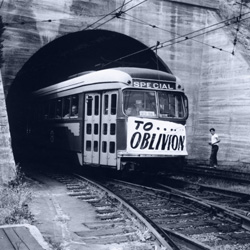
|
||
|
Issue 65 |
|
12 March 2012 |
|
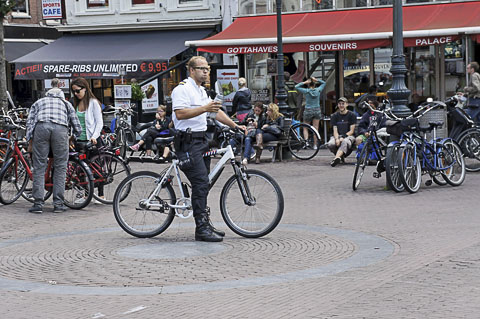 Bicycle policeman, Leidseplein, Amsterdam Yes, in The Netherlands, the cops ride bikes, just like everyone else. ©2011 J.Crawford AnnouncementsVideoI have continued making videos this winter. One of the newest releases, "Car Trouble: And How to Fix It" is embedded below, and you can watch it in HD if your connection is fast enough:
|
|
|
|
There are a number of other, shorter videos in the past couple of months. You can watch them all at:
Vimeo (up to 720p)
Thanks to Enrico Canali, "Occupy All Streets" got Portuguese subtitles and drew quite a few viewers from Portugal and Brazil. If you watch a video, please Like it by mousing over and clicking the Heart icon in the top-right of the video frame (Vimeo) or clicking the Thumbs Up icon below the video (YouTube). Posting to Twitter and Facebook will also help if you can. We need to get the message out to a broader audience. There is now a video page at Carfree.com. It's not always entirely up to date, however. Vimeo is updated before YouTube, so Vimeo is the go-to location for the most recent videos. Most of the films are released under a Creative Commons Non-Commercial Attribution license, so you're free to use them as long as you acknowledge the source and the Creative Commons license. I would have simply put the material in the public domain, but I used other Creative Commons licensed material that requires the same terms and conditions. The BooksCarfree Cities and Carfree Design Manual are widely available in Europe and North America.
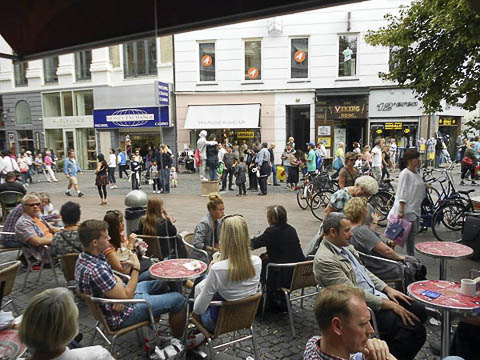 Stroget (a 2-km pedestrianized street ) Copenhagen, Denmark ©2011 Karen Sandness World Carfree NetworkCarfree.com actively supports World Carfree Network (WCN). The network stands at the point of some degree of renewal and rebirth and could use your help if you have time available. The main news from the network follows.World Carfree Network BulletinSubscribe to and read the monthly WCN Bulletin, now available in Czech, English, French, German, Italian, Portuguese and Spanish. It's a great way to keep abreast of important developments affecting the carfree movement. The Bulletin needs new translators for the Italian and Portuguese editions. A web programmer to help improve the Bulletin section of the WCN website is also needed. As always, submissions for the Bulletin are welcome. To volunteer, send mail.Join the World Carfree Media TeamIf you're passionate about the carfree solution to urban gridlock, help make a difference by getting the word out. Join the media team, which will keep an eye out for items in the media that need our attention and response. We'll make some media noise ourselves, too. Send email to WCN Media.
|
|
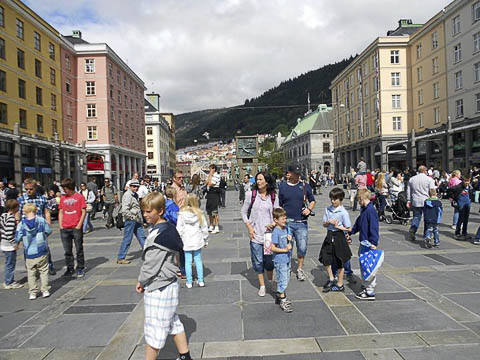 Bergen, Norway, a pedestrianized area three blocks long in the center of the city ©2011 Karen Sandness News BitsThe articles I consider most important come first. Left-clicking on a link below will open it in a new browser window or tab:
"Using the Courts to Support Pedestrian Rights in Dhaka" On 5 March 2012, the High Court in Bangladesh issued a landmark ruling that could lead to major improvements for walking and other non-motorized travel. The ruling came in response to two writ petitions. Among other things, the ruling states that the government must stop vehicles, particularly motorcycles, from getting on footpaths (sidewalks) and walkways; paint zebra crossings on various intersections within 15 days, and provide information on rickshaw bans and on the number of motorized vehicles in the city. The government was asked to explain why it should not be directed to provide sufficient segregated paths for pedestrians and non-motorized vehicles and to remove obstacles for people walking on existing footpaths. Among those arguing for the case were Professor Sarwar Jahan of the Bangladesh University of Engineering and Technology, who explained that while rickshaws occupy 40% of road space they move almost 54% of passengers; cars take up 39% of road space but transport fewer than 9% of passengers. Similarly, bicycles utilize only 1.7% of road space to move 2.5% of passengers. The decision itself would be of little use without people ready to campaign for its enforcement; fortunately there are plenty of individuals and a few organizations ready to take the issue forward. The high level of frustration among pedestrians with motorcycles on the footpaths should also help ensure effective implementation. Already, only two days after the decision, the extensive media coverage it has received means that the general public seems already aware of it; intensive campaigning could set an example for other countries in the region suffering from the same problem, that it is indeed possible to redress this wrong and restore pedestrians their rights. "Thinking Like a System about Climate Science"
"Let's Visit a Car-Free Village, Built from Scratch"
(Small Streets Blog) These links are worth visiting if you find the main article interesting: Google Maps aerial Turn This Parking Lot Into a Village Small Streets home page "Republic of Drivers: A Cultural History of Automobility in America"
"Reflections Of An Optimist: A Blog By Debra Efroymson"
"The Pedestrian Loses the Way"
"Imagining a City Without Its Public Transportation"
"Direct Fossil Fuel Subsidies Worldwide: Half a Trillion Dollars Annually"
"The High Cost of Free Parking" [PDF!]
"Pay As You Go road pricing report"
"Building Sustainable Future Needs More Than Science, Experts Say"
"The Real Reason Why Bicycles are the Key to Better Cities"
"Climate change will shake the Earth - literally "
"A candid talk about the future of America’s cities, towns and neighborhoods." [PDF!]
"Most Americans Want a Walkable Neighborhood, Not a Big House"
"Electric Vehicles Pollute More than Gas-Powered"
"Walk, Bike to Work in Salt Lake’s Answer to Suburban Nightmares"
"You Like Walking in the City? So Do Plenty of Others"
"Unearthing the True Cost of Fossil Fuels"
"Tallinn to Poll Citizens on Free Public Transport"
"The important difference between a road and a street" [video]
"How Do You Wean People Off Cars? By Rebranding Bikes And Buses"
"Money Is All That's Green in Biodiesel"
"End of the Roads: When Highway Removal Works"
"The European Cycle Logistics Federation"
"Editorial: Why we need Complete Streets"
Do You Like the New Format?Carfree Times has a new format that has evolved over the past two issues. As of this issue, there are no condensed articles and the former Hot Links section is gone. In their place is the listing just above of all the interesting articles in the media since the last issue. I'm finding that Facebook and Twitter are changing the ways I get news, and I suspect the same is true for many of you. The advantage of a quarterly e-zine is that it provides a permanent record that is easily retrieved, unlike social media. Otherwise, I might consider dropping the media citations entirely. If you have strong feelings about this, please send mail. |
|
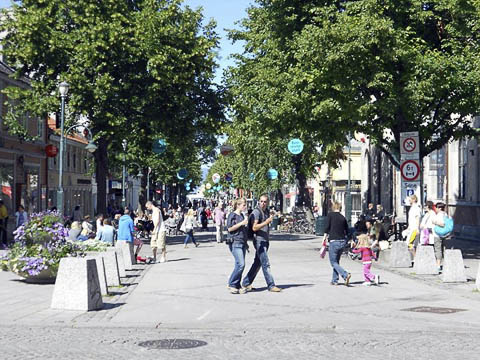 Trondheim, Norway ©2011 Karen Sandness Feature ArticleCan Karaoke transform public spaces?By Rachel SmithWhen my colleague Jing suggested Karaoke for a team social there were gasps of despair and our manager hastily booked lanes at the local ten-pin bowling alley. On the other side of the world, in a not-so-pristine park in Berlin, an Irish guy called Joe draws crowds of more than 3,000 people…. and that's before the karaoke has even begun. Which got me thinking, can karaoke transform our public spaces?It seems an odd thing to say, but yes, I believe it probably can. Councils, government agencies and marketing bureaus across the globe strive to find ways to get people into parks and using public spaces. Some spend millions with extravagant firework spectaculars whilst others import international music acts and others have an almost continual supply of farmer's markets and craft fairs, many of which seem to fail to deliver a certain je ne sais quoi. When my trusted Lonely Planet guidebook told me that Bearpit Karaoke was a "must see" for a Sunday afternoon in Berlin I couldn't resist investigating! I arrived at Mauerpark amazed at the activity. The Flea market was in full swing with hundreds of people buying and selling old bikes, vintage clothes and "maker movement" crafts. People, young and old, relaxed on the unkempt grass surrounded by complimentary entertainment from skateboard tricksters, circus performers and wannabe rock stars. In the stone amphitheatre a contortionist was pleasing a small but happy audience. As I sat watching and waiting it was apparent that something big was going down. Within minutes the crowd of a hundred or so had swelled to at least a thousand; families, locals, students and tourists, and in less than half an hour it was standing room only. As the contortionist took her final bow, the crowd broke into rapturous applause as a scruffy looking guy in a checked shirt and baseball cap walked across the stage. This was it, Joe Hatchiban was here and my opinion of karaoke was about to be changed. Since the winter of 2009 Joe has been using portable, battery-powered boxes on a "hacked" cargo bike to help people unleash their inner Rampensau. Weather permitting, Joe fetches up around 3pm and invites anybody who so wishes to take the stage for a few minutes to show those gathered there what they can do with a backing track and a microphone. Joe has shown that with no budget, a very large serve of motivation, Facebook and people's desire to "get involved" you really can transform a public space. Bottom-up approaches are changing patterns of activity in our cities. The Australian Government's new Urban Design Protocol for Australian cities "Creating places for people" aimed at professionals and the general public, opens with this poignant quote from Jan Gehl "First life, then spaces, then buildings: the other way around never works". Without a shadow of a doubt Ottery St Mary, a chocolate box village in rural Devon (UK), puts life first. Each and every year on Guy Fawkes Night locals run through their narrow streets brandishing burning barrels. Those who have visited Ottery on November 5th know that perpetuating a tradition is the objective and commercial considerations take second place, as the website says "if you attend it, don't try and change it, just stand back and enjoy". I admit, when you're there, in the crowd, with 20,000 others and a very large ball of fire is coming right toward you it's hard to understand what motivates men, women and children into carrying a full sized lighted tar barrel on their shoulders and then run down the street. But, what I do know is that these brave folks are accepting complete strangers into their public space to enjoy an exhilarating and risky spectacle. Of course it's deemed dangerous, but good organisation, cooperation between the various agencies involved and people using good old-fashioned common sense manages the risk. Back in Brisbane my Lazy Sunday Cycle co-founder Amy Saunders is passionate about encouraging interactions between people of different generations, cultural and socio-economic backgrounds. Amy founded Games Night @ King George Square to help break down barriers in society. On the last Thursday of every month, in a public square in Brisbane CBD, board games can be played by anyone and with anyone. Like Joe, Amy doesn't have a big budget but what she does have is proven knowledge that people crave interaction and a desire to be part of something fun. I guess that's why, with the help of social media, more than 300 people attend each and every event. These stories provide a basis for taking action - but please don't run down your road with a burning barrel! - by demonstrating that low cost activities in the public realm can help to support diverse and resilient communities with positive benefits for individuals. Creating and maintaining parks and public spaces costs money and the economic merits are regularly called into question. If we really want public spaces to be "places" and a central part of our towns and cities we need to learn from people like Joe, Amy, and the Ottery "barrel rollers," but most of all we need to embrace the new movement of "bottom-up self-organization." The real reason that people turn up every week for Bearpit Karaoke, isn't because they don't have access to iTunes., It's because they want the buzz of being part of something fun, the supportive applause that comes from peer-to-peer performances, and the serendipitous connections with people they wouldn't normally meet. I guess that's why karaoke really has the potential to transform our public realm.
Rachel Smith is a Principal transport Planner with AECOM in Brisbane.
She is the founder of Cycling Super Highways, co-founder of Lazy Sunday Cycle, and part of the BMW Guggenheim Lab (Berlin Lab Team).
Film
This excellent documentary is full of wonderful footage of America's city streets before and during the highway industry's successful effort to supplant street cars with buses and automobiles. Even though the film was made in 1996, it's very topical in today's discussion of the corporate control of American government. There is not a lot here that many readers of Carfree Times didn't already know, but it's a significant film even for those familiar with the events. The culpability of the highway interests in destroying America's public transport system really strikes home when you watch this film. The assembly of all the gritty details in one place will move you, perhaps to tears. None of it had to be this way. There was nothing inexorable about the rise of the automobile. If the railroads had fought back against the highway interests, we might have had another outcome. Well worth an hour of your time. This would be an excellent warm-up film for many different gatherings. You can practically smell the acrid stench of diesel buses and the smoke from the burning of our once-beloved street cars.
Back to Carfree.com
E-mail
|
